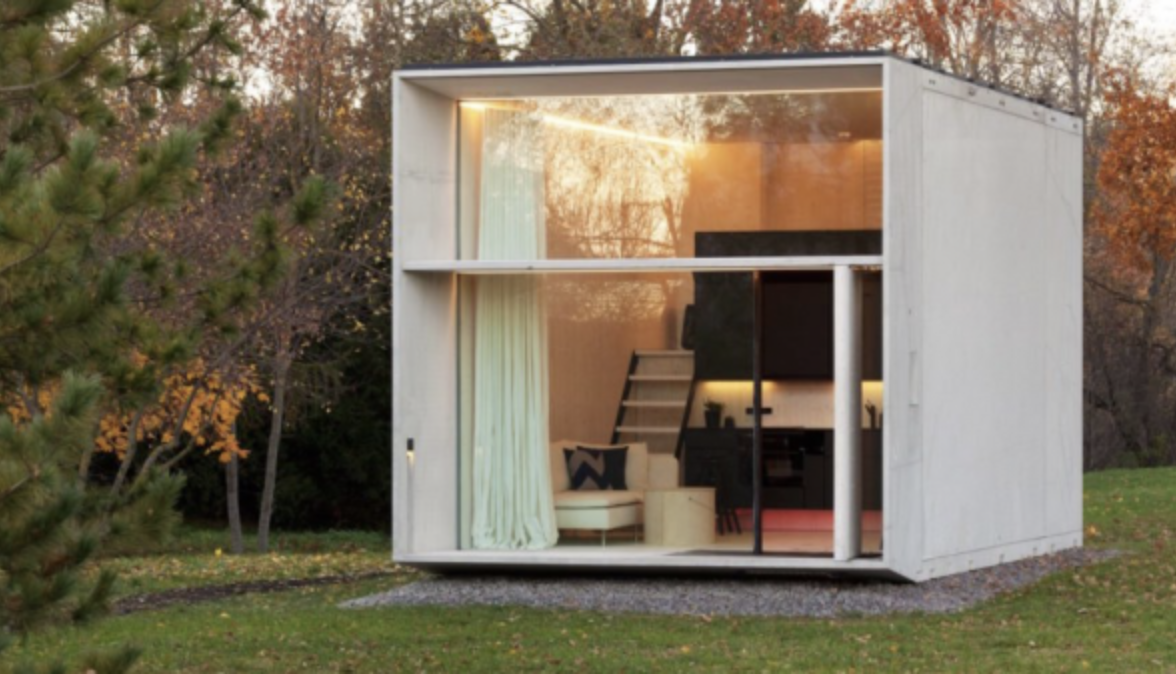How to resolve the housing crisis?
A survey finds we Brits are becoming increasingly concerned about the serious shortage of housing in the UK - and many of us have ideas on how to sort it out

The Government's announcement that it plans to lift the ban on councils borrowing against the value of their land and housing stock to finance the building of more social housing has been welcomed by housing charities. Meanwhile Brits see the answer to the shortage of decent homes lying in building more co-living developmentsand micro-homes for urban dwellers. Pictured above: a modern micro house. But of course while tiny houses might appeal to single people, they aren't suitable for bringing up a family.
Building more co-living developments and micro-homes in urban areas top the list of people’s preferred solutions to the housing crisis, according to research by the Federation of Master Builders, while building on the greenbelt is the least favoured solution.
The FMB asked 2,000 home owners across the UK if there is a housing shortage and if so, how best to address this shortage.
• Two-thirds (66 per cent) believe there is a shortage of housing Britain.
• When asked for views on the most appropriate solutions to shortage, the most commonly cited were:
1) Build more co-living developments (33 per cent)
2) Build more micro-homes in urban areas (31 per cent)
3) Build more granny flats (31 per cent)
4) Extend permitted development rights (27 per cent)
5) Encourage more multi-generational living (24 per cent)
6) Excavate or convert more basements underneath existing properties (18 per cent)
7) Build on the greenbelt (17 per cent)
Brian Berry, FMB chief executive says no one can deny housing is a crisis issue in Britain: 'Even the vast majority of those lucky enough to own their home recognise there’s a housing shortage. Asked about solutions to this problem, the most popular remedy is to construct more co-living developments, which are becoming popular in cities across the globe. And building more micro-homes in urban areas is the second most commonly-cited solution to our housing crisis.
'Both of these approaches would increase density in urban areas where demand is particularly high. The creation of more granny flats is the third most popular solution, which would see more elderly people moving out of their properties and living alongside children or grandchildren in self-contained home extensions. This would free up much-needed family homes, which are being under-used by older people living on their own. Perhaps unsurprisingly, home owners, who are clearly already on the property ladder, see building on the greenbelt as the least desirable option.'
Berry thinks these solutions give food for thought, however he believes local building firms could hold the key to meeting housing needs in particuarly areas. 'If we want to solve the crisis, we need to reduce barriers to small, local building firms. Federation of Master Builders' research shows that the lack of small sites and difficulties hiring skilled tradespeople are limiting the number of homes these firms can build.
'Removing barriers to SME house builders matters, as in the late 1980s, two-thirds of all new homes were built by small local house builders and this was a time when house building was in step with demand. Today SME house builders build less than one quarter of all new homes and as this proportion has declined, so too has the capacity of our industry to deliver the homes we need. Reviving the fortunes of SME builders undoubtedly has a key role to play in delivering the Government’s target of 300,000 new homes a year in England alone, and is key to solving the housing crisis once and for all.'
Definition of terms
• Micro-homes: Homes smaller than 37m2.
• Co-living developments: Co-living developments include small private studios and include shared spaces and facilities such as kitchens and TV rooms.
• Granny flats: Self-contained housing unit located on the grounds of a single-family home.
• Permitted development rights: A national grant of planning permission which allows certain building works and changes of use to be carried out without having to make a planning application.
• Multi-generational living: More than two generations living under the same roof.
• Greenbelt: An area of open land around a town or city, on which building is restricted.
• Basements: The floor of a building which is partly or entirely below ground level.
*Decomag would like to see more brownfield sites freed up for housing made off-site using modular technology. We urge councils to talk to innovators such as Userhuus which has developed modular units with integral low energy features that can be configured as flats or family houses.
.